ON THIS DAY
— June 6, 1968 —
‘SENATOR ROBERT KENNEDY IS DEAD’
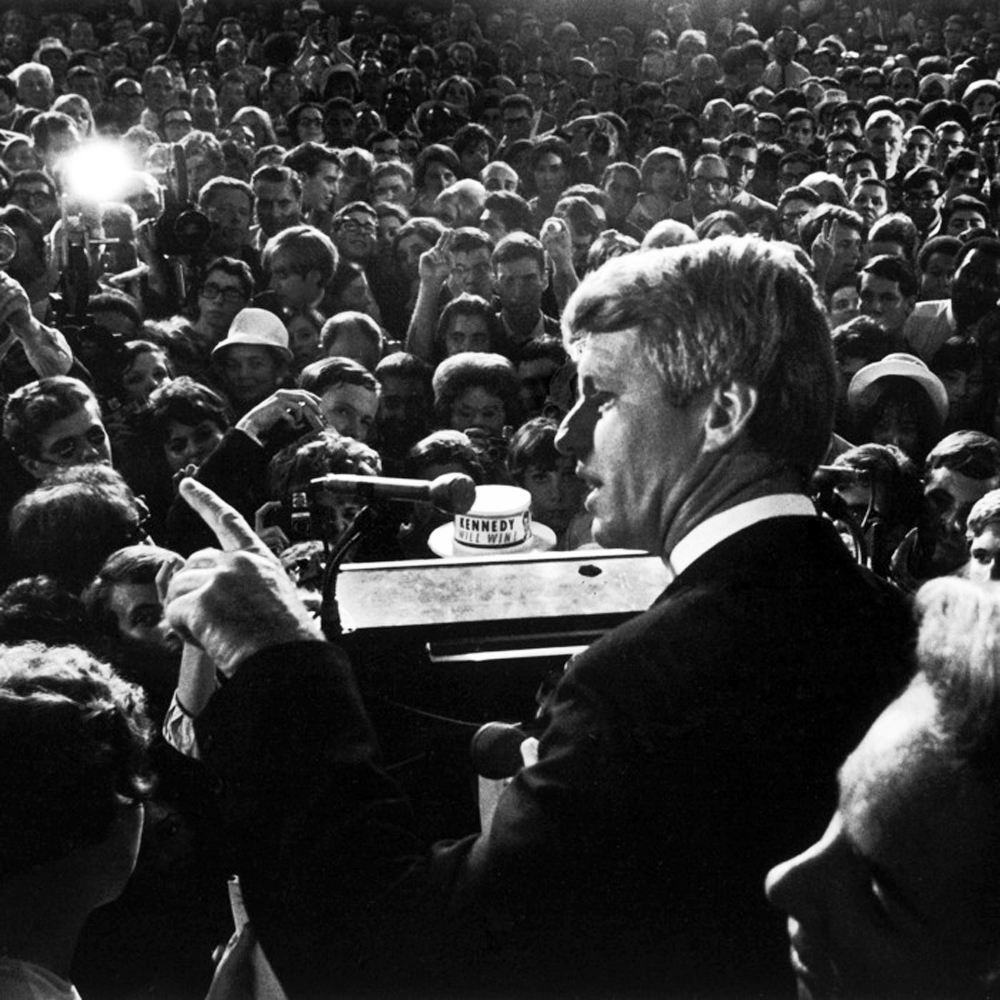
On June 5, 1968, presidential candidate Robert F. Kennedy was mortally wounded shortly after midnight at the Ambassador Hotel in Los Angeles. Earlier that evening, the 42-year-old junior senator from New York was declared the winner in the South Dakota and California presidential primaries in the 1968 election. He was pronounced dead at 1:44 a.m. PDT on June 6, about 26 hours after he had been shot.
Following dual victories in the California and South Dakota primary elections for the Democratic nomination for President of the United States, Senator Kennedy spoke to journalists and campaign workers at a live televised celebration from the stage of his headquarters at the Ambassador Hotel. Shortly after leaving the podium and exiting through a kitchen hallway, he was mortally wounded by multiple shots fired from a handgun. Kennedy died in the Good Samaritan Hospital 26 hours later. The shooter was 24-year-old Sirhan Sirhan.
Kennedy planned to walk through the ballroom when he had finished speaking. He ended the speech by stating: “My thanks to all of you; and now it’s on to Chicago, and let’s win there!” He was on his way to another gathering of supporters elsewhere in the hotel. Reporters wanted a press conference, and campaign aide Fred Dutton decided that Kennedy would forgo the second gathering and instead go through the hotel’s kitchen and pantry area behind the ballroom to the press area.
Kennedy’s only security was provided by former FBI agent William Barry and two unofficial bodyguards: Olympic decathlon gold medalist Rafer Johnson and former football player Rosey Grier. Kennedy finished speaking and started to exit when William Barry stopped him and said, “No, it’s been changed. We’re going this way.” Barry and Dutton began clearing a way for Kennedy to go left through swinging doors to the kitchen corridor, but Kennedy was hemmed in by the crowd and followed maître d’hôtel Karl Uecker through a back exit.
Uecker led Kennedy through the kitchen area, holding his right wrist, but frequently releasing it as Kennedy shook hands with people whom he encountered. Uecker and Kennedy started down a passageway narrowed by an ice machine against the right wall and a steam table to the left. Kennedy turned to his left and shook hands with busboy Juan Romero, just as Sirhan Sirhan stepped down from a low tray-stacker beside the ice machine, rushed past Uecker, and repeatedly fired an eight-shot .22 Long Rifle caliber Iver Johnson Cadet 55-A revolver.
Kennedy fell to the floor, and bodyguard William Barry hit Sirhan twice in the face while others, including writer George Plimpton and football player Rosey Grier, forced him against the steam table and disarmed him, as he continued firing his gun in random directions. Five other people were wounded in addition to Kennedy: William Weisel of ABC News, Paul Schrade of the United Automobile Workers union, Democratic Party activist Elizabeth Evans, Ira Goldstein of the Continental News Service, and Kennedy campaign volunteer Irwin Stroll.
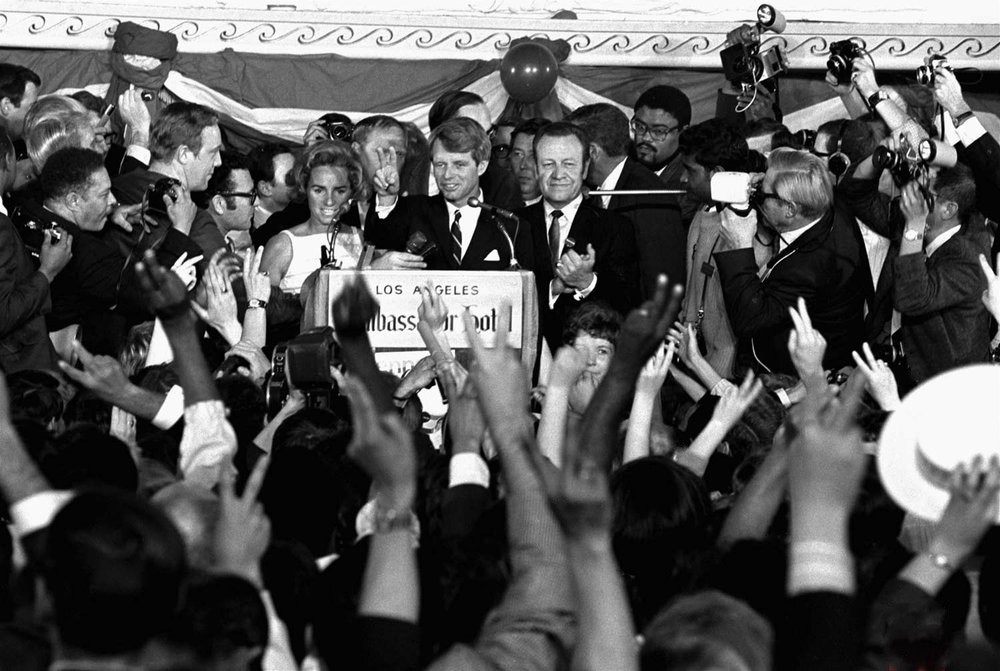
After a minute, Sirhan wrestled free and grabbed the revolver again, but he had already fired all the bullets and was subdued. Barry went to Kennedy and placed his jacket under the candidate’s head, later recalling: “I knew immediately it was a .22, a small caliber, so I hoped it wouldn’t be so bad, but then I saw the hole in the Senator’s head, and I knew”. Reporters and photographers rushed into the area from both directions, contributing to the confusion and chaos. As Kennedy lay wounded, Juan Romero cradled his head and placed a rosary in his hand. Kennedy asked Romero, “Is everybody OK?” and Romero responded, “Yes, everybody’s OK.” Kennedy then turned away and said, “Everything’s going to be OK.” This moment was captured by Life photographer Bill Eppridge and Boris Yaro of the Los Angeles Times and became the iconic image of the assassination. There was some initial confusion concerning who was shot, one witness believing that the primary victim was Kennedy’s campaign manager and brother-in-law Stephen Edward Smith.
Kennedy’s wife Ethel was three months pregnant; she stood outside the crush of people at the scene seeking help. She was soon led to her husband and knelt beside him. He turned his head and seemed to recognize her. Smith promptly appeared on television and calmly asked for a doctor. Friend and journalist Pete Hamill recalled that Kennedy had “a kind of sweet accepting smile on his face, as if he knew it would all end this way”. After several minutes, medical attendants arrived and lifted Kennedy onto a stretcher, prompting him to whisper, “Don’t lift me”, which were his last words, as he lost consciousness shortly after. He was taken a mile away to Central Receiving Hospital, where he arrived near death. One doctor slapped his face, calling, “Bob, Bob”, while another doctor manually massaged his heart. After obtaining a good heartbeat, doctors handed a stethoscope to Ethel so that she could hear his heart beating.
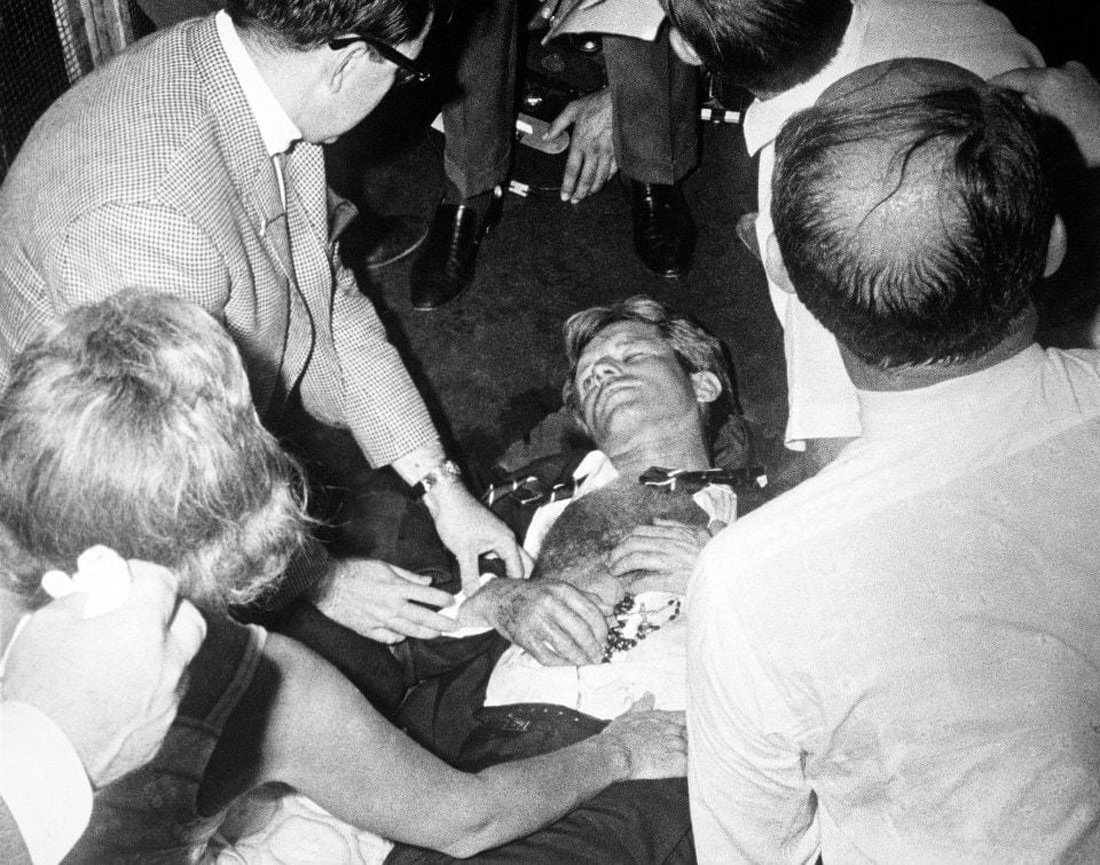
After about 30 minutes, Kennedy was transferred several blocks to the Hospital of the Good Samaritan to undergo surgery. A gymnasium near the hospital was set up as temporary headquarters for the press and news media to receive updates on his condition. Surgery began at 3:12 a.m. and lasted three hours and 40 minutes. At 5:30 p.m. on Wednesday, spokesman Frank Mankiewicz announced that Kennedy’s doctors were “concerned over his continuing failure to show improvement”; his condition remained “extremely critical as to life”.
Kennedy had been shot three times. One bullet was fired at a range of perhaps 1 inch (3 cm) and entered behind his right ear, dispersing fragments throughout his brain. The other two entered at the rear of his right armpit; one exited from his chest and the other lodged in the back of his neck. Despite extensive neurosurgery to remove the bullet and bone fragments from his brain, he was pronounced dead at 1:44 a.m. on June 6, nearly 26 hours after the shooting.
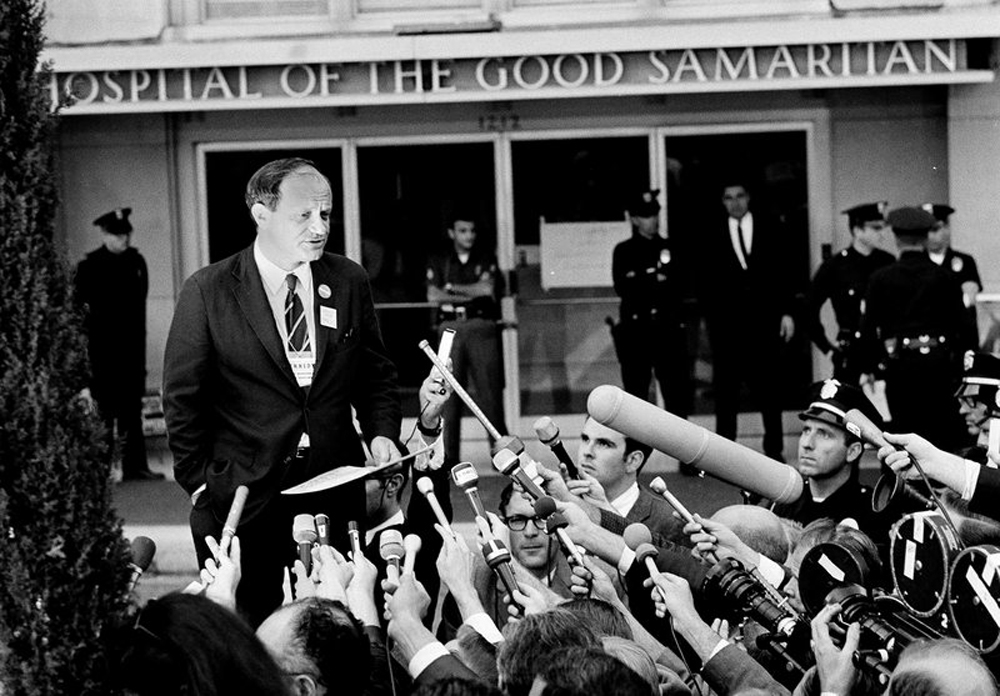
Frank Mankiewicz left the hospital and walked to the gymnasium where the press and news media were set up for continuous updates on the situation. At 2 a.m. on June 6, Mankiewicz approached the podium, took a few moments to compose himself, and made the official announcement:
I have a short announcement to read, which I will read at this time. Senator Robert Francis Kennedy died at 1:44 a.m., today, June 6, 1968. With Senator Kennedy at the time of his death were his wife Ethel, his sisters Mrs. Stephen Smith, Mrs. Patricia Lawford, his brother-in-law Mr. Stephen Smith and his sister-in-law Mrs. John F. Kennedy. He was 42 years old.
At the time of the shooting, NBC and ABC News were signing off from their electoral broadcasts, while the CBS coverage had already concluded. CBS coverage began 21 minutes after the shooting with Joseph Benti, then preparing his anchoring duties for TheCBS Morning News, from the election studio at the CBS Broadcast Center in New York; Walter Cronkite joined him a half hour later. Mike Wallace had co-anchored the primary election coverage with Cronkite and Benti, and he appeared briefly after the shooting. CBS reporters Terry Drinkwater and David Schumacher delivered on-camera updates and interviews from the Ambassador; colleagues Roger Mudd and John Hart phoned in reports to New York. Later, Mudd presented on-camera updates on Kennedy’s condition from Good Samaritan Hospital.
Kennedy’s remains were taken to St. Patrick’s Cathedral, New York for two days of public viewing before a funeral Mass was held on June 8. His funeral train traveled from New York to Washington, D.C., and throngs of spectators lined the route to view the journey. His body was interred at night in Arlington National Cemetery near his brother John.
Source: ‘see The Assassination of Robert F. Kennedy’ (above article edited; condensed) Wikipedia
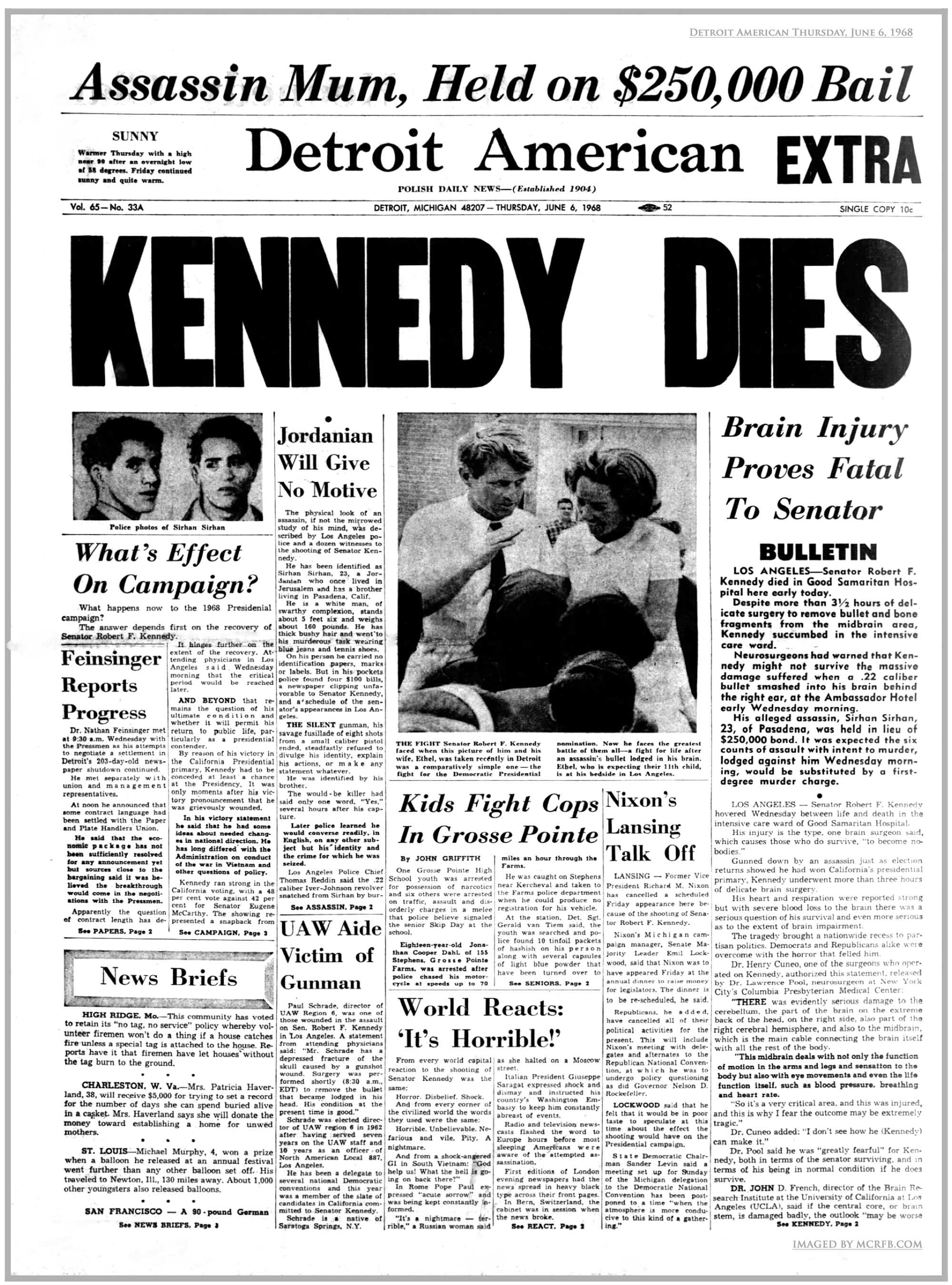
On your mobile device? Tap on above newspaper image. Open to second window. “Stretch” image across your device screen to magnify for largest print view.
On your PC? Click on the newspaper image 2x for largest print view.
![]()
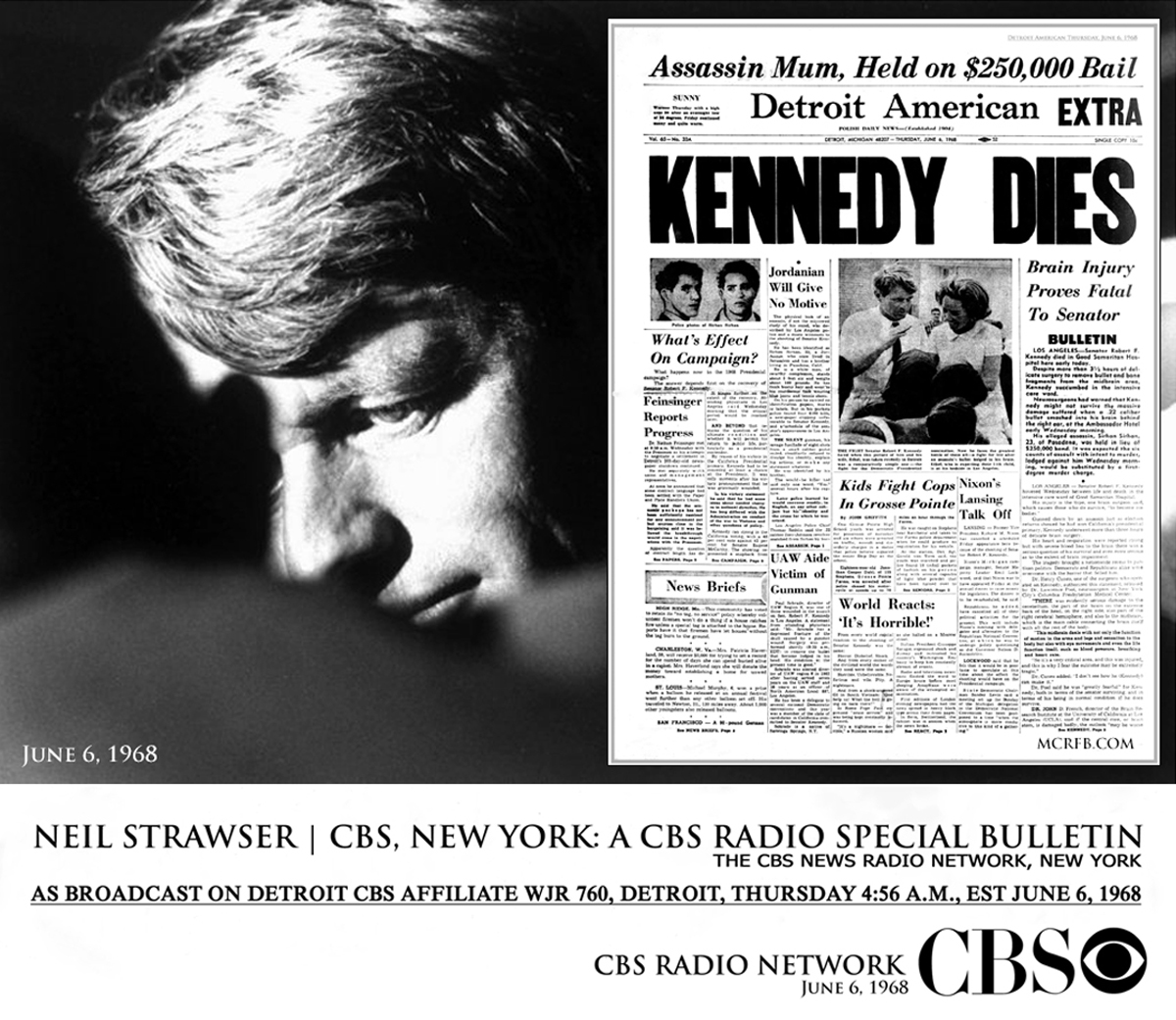



Everything good in this world has been killed. And only demons remain, to lead this world.
We do not forget!